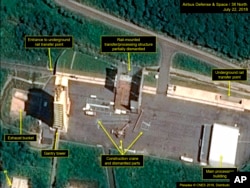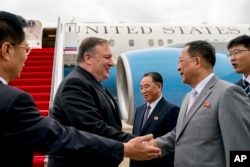U.S. Secretary of State Mike Pompeo added to growing skepticism about North Korea’s commitment to eliminate its nuclear weapons arsenal, while testifying at a Senate committee hearing on Wednesday.
In response to a question from Democratic Senator Edward Markey of Massachusetts, Pompeo told the Senate Foreign Relations Committee that North Korea is still producing fuel for nuclear bombs.
“Yes, they continue to produce fissile material," Pompeo said.
The secretary of state declined to answer other questions about whether the North is continuing to develop other facets of its nuclear program, along with its submarine-based ballistic missiles capability, saying he did not want to reveal potentially classified information.
However, Pomeo cited the recent talks with North Korea as "verifiable evidence" of progress toward implementing the broad denuclearization agreement reached by U.S. President Donald Trump and North Korean leader Kim Jong Un at the Singapore Summit in June.
Sohae assessment
The Trump administration also praised North Korea for taking unilateral action to dismantle key facilities used to develop engines for ballistic missiles at its Sohae Satellite Launching Station, that was revealed in satellite images released this week. Trump has said Kim promised to close the facility during their Singapore meeting.
North Korea analysts with the Center for Strategic an International Studies in Washington say it is a significant symbolic gesture to shut down the Sohae site that was used to test liquid fuel missile engines, and launch so called satellites into space that were widely seen as a cover for testing long-range ballistic missiles.
But Sue Mi Terry, a CSIS Korea scholar and former CIA analyst, points out the Sohae site is seen as somewhat obsolete, as North Korea has advanced to develop solid based fuels that can be preloaded, and mobile launchers that make it more difficult to track their missile site locations.
“You can make an argument that, yeah, this looks like a concession of sorts, but it is still a cosmetic concession. We are not really seeing active steps toward denuclearization,” said Terry during a CSIS podcast on Wednesday.
Nuclear nonproliferation expert Jeffrey Lewis agrees that dismantling Sohae does not limit the North’s nuclear capability, or ability to strike the U.S. mainland with an intercontinental ballistic missile (ICBM.)
“Removing the engine test stand doesn’t mean North Korea has to stop producing ICBMs. It can continue producing ICBMs. It just cannot test them at that stand. It could still fire them and flight-test them off a launcher, if all of this collapses,” said Lewis, who is the director of the East Asia nonproliferation program at the Middlebury Institute of International Studies at Monterey in California.
Also concerning for Victor Cha, the CSIS Korea Chair, is that North Korea has not allowed in inspectors from the International Atomic Energy Agency (IAEA) or other independent organizations to verify that the denuclearization measures being taken are complete and irreversible.
“The news that we hear of the Sohae satellite launch test site being taken down is largely coming from overhead commercial satellite imagery. There is no inspector from the IAEA or anywhere else on the ground,” said Cha, who is a former director for Asian affairs at the National Security Council (NSC) for President George W. Bush.
Cha sees the Kim government’s actions in closing down Sohae as a good trust building measure in response to President Trump’s decision to suspend joint military exercises with South Korea.
But nuclear negotiations between Washington and Pyongyang, he said, has not yet begun in earnest as North Korea has not even taken the initial step to declare the extent of its nuclear program.
The two sides remain sharply divided over U.S. demands for the North to completely dismantle its nuclear and ballistic missiles program before receiving any concessions, including the easing of tough U.N. sanctions that block 90 percent of the country’s trade.
North Korea wants a more phased-in approach with significant rewards, such as ending sanctions and beginning economic aid and investment, tied to incremental progress.
Pyongyang is also pushing for a peace declaration this year from the U.S. and South Korea that would lead to an official peace treaty replacing the armistice in place since the end of the Korean War in 1953. Critics say that such a declaration could be used to undermine the justification for the U.S. military presence in South Korea.
The Trump administration has criticized past U.S. presidents for providing North Korea concessions in exchange for denuclearization promises that were never kept.
Lee Yoon-jee contributed to this report









